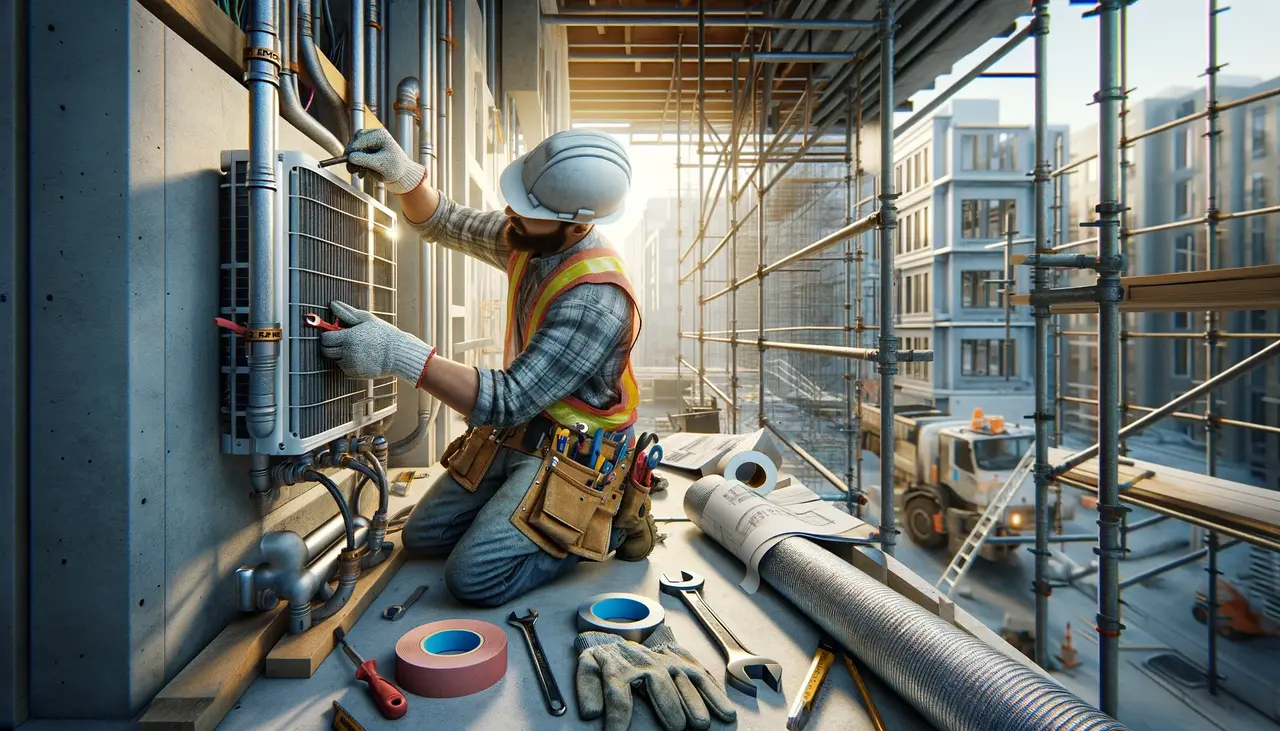Introduction to HVAC courses
HVAC courses provide essential skills for a successful career in construction. These courses teach you how to install, repair, and maintain heating, ventilation, and air conditioning systems. By enrolling in HVAC courses, you’ll learn about the following key skills:
- Understanding HVAC systems and components
- Proper installation techniques
- Troubleshooting and repair procedures
- Energy efficiency practices
- Safety protocols and regulations
These skills will equip you with the knowledge and expertise needed to excel in the construction industry, opening up opportunities for career growth and advancement.
Importance of HVAC skills in construction
HVAC skills are essential in construction as they provide expertise in heating, ventilation, and air conditioning systems. By mastering HVAC skills, you gain the ability to ensure buildings have appropriate temperature control, air quality, and ventilation. This knowledge elevates your construction career by making you a valuable asset in various construction projects. HVAC skills also allow you to contribute to creating comfortable and efficient living and working spaces, adding a significant advantage to your construction skill set.
Fundamentals of HVAC systems
HVAC systems are essential for controlling the temperature and air quality in buildings. In HVAC courses, you’ll learn the fundamentals of how these systems work, including how to install, maintain, and troubleshoot them. Some key skills you’ll acquire include understanding the principles of heating, ventilation, and air conditioning, as well as learning about different types of HVAC systems, such as split systems and packaged units. By mastering these fundamentals, you’ll be well-equipped to excel in your construction career.
Key concepts covered in HVAC courses
In HVAC courses, you can expect to learn about fundamental concepts such as heating, ventilation, and air conditioning systems. Additionally, you will delve into topics like thermostat installation, ductwork design, and energy efficiency strategies. Understanding these key concepts will be crucial in advancing your knowledge and skills in the construction industry.
Hands-on training and practical skills development
You’ll get to practice real-world scenarios in HVAC courses, honing your skills through hands-on training. These practical sessions help you apply theoretical knowledge to actual situations, preparing you for challenges in your construction career. By working directly with HVAC equipment, you’ll develop a strong foundation in troubleshooting, maintenance, and repair tasks, enhancing your expertise and confidence in the field.
Understanding HVAC equipment and tools
In HVAC courses, you will learn about different tools and equipment used in heating, ventilation, and air conditioning systems. Some key points to understand about HVAC equipment and tools include:
- HVAC systems consist of components such as furnaces, air conditioners, heat pumps, ductwork, thermostats, and refrigerant lines.
- Proper understanding of tools like multimeters, duct tape, pipe wrenches, and tube cutters is essential for troubleshooting and repairing HVAC systems.
- Learning how to use tools safely and efficiently will help you become proficient in maintaining and installing HVAC equipment.
- Familiarity with various HVAC tools and equipment will enable you to diagnose issues, conduct repairs, and perform installations effectively in your construction career.
Safety precautions in HVAC work
Safety is a top priority in HVAC work to prevent accidents and ensure the well-being of workers. Here’s what you can expect in terms of safety precautions when working in HVAC:
- Use of Personal Protective Equipment (PPE): This includes wearing safety goggles, gloves, and other protective gear to prevent injuries.
- Proper Handling of Tools and Equipment: Always use tools and equipment correctly and follow manufacturer instructions to avoid accidents.
- Regular Maintenance of Equipment: Ensuring that HVAC systems are regularly serviced and maintained can prevent malfunctions that could lead to safety hazards.
- Knowledge of Electrical Safety: Understanding how to safely work with electricity to prevent electrical shocks and fires is crucial in HVAC work.
- Awareness of Chemical Safety: Being aware of any chemicals used in HVAC work and following proper handling procedures can prevent exposure and accidents.
Remember, following safety protocols is essential to having a successful and injury-free career in HVAC.
Industry certifications and qualifications
Industry certifications, such as EPA 608 and NATE, can enhance your credibility and open up more job opportunities in the HVAC field. These certifications demonstrate your expertise and commitment to quality work, making you a more attractive candidate to potential employers. Additionally, completing HVAC courses can provide you with the necessary qualifications to work on specific types of equipment and systems, ultimately boosting your construction career prospects.
Job opportunities for HVAC professionals
Your completion of HVAC courses will open up numerous job opportunities in the construction field. HVAC professionals are in high demand across residential, commercial, and industrial sectors. Here are several job opportunities you can pursue with your newly acquired skills:
- HVAC Technician
- HVAC Installer
- HVAC Maintenance Technician
- HVAC Project Manager
- HVAC Sales Representative
With the increasing focus on energy efficiency and environmental sustainability, HVAC professionals play a crucial role in ensuring buildings operate efficiently and sustainably. This demand for skilled professionals means that your expertise in HVAC will set you on a path to a rewarding and stable career in the construction industry.
Advancing your construction career with HVAC skills
If you are looking to level up your construction career, learning HVAC skills can be a game-changer. HVAC skills not only add value to your resume but also open up new opportunities in the construction industry. By mastering HVAC, you can work on a wide range of projects, from residential buildings to commercial spaces. These skills can boost your earning potential and make you a sought-after professional in the industry.


